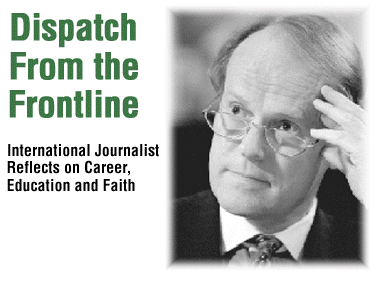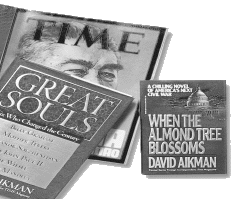Photos by
Jimi Lott

![]()
David Aikman Inspires Seattle Leaders With Stories of "Great Souls"
The international journalist and former Time magazine foreign
correspondent was guest of honor at SPU's Greater Seattle Community Breakfast,
held at the Sheraton Hotel in downtown Seattle. Co-hosting the event were
Phyllis Campbell, president of US Bank of Washington; Roger Eigsti, chairman
and CEO of Safeco; and Jack McMillan, director of Nordstrom.
The purpose of the annual breakfast, says SPU President Eaton, is to present a stimulating
forum for the exchange of ideas, as well as to acquaint community members with the
University's mission. "Our vision is this: We believe that a
university should be deeply engaged in its community," said Eaton in his opening
remarks. "We should be about the business of engaging the culture, and then
attempting to make a real impact in the world around us for good."
That theme was echoed by Aikman during his address, which was drawn from his
most recent book, Great Souls: Six Who Changed the Century. Aikman
explained that the individuals he chose to write about had each influenced
the world for the better through the embodiment of specific virtues: Billy
Graham (humility), Nelson Mandela (forgiveness), Aleksandr Solzhenitsyn
(truth), Mother Teresa (compassion), Pope John Paul II (human dignity)
and Elie Wiesel (remembrance). Whether or not people agreed with his choices,
Aikman asked his Seattle audience to take hope in the struggles and triumphs
of "great souls" everywhere.
Top: Greeting Aikman (center) were (left to right) SPU President Philip Eaton,
SPU Vice President Robert McIntosh, World Vision President Richard Stearns and Wallace
Properties Managing Partner Robert Wallace. Bottom: Aikman spoke of 20th century people who
"lived out hope" in the midst of adversity.
"I think one of the things our great nation needs is a sense of community,
propelled by men and women of conviction, of humility, of mercy, of truth,
of forgiveness, of generosity," Aikman said. "These are big words, often
difficult to live out, but I think . . . when the attempt is made resolutely,
without regret, and with courage, it can change not only a family, a community,
a town, a state, a nation -- it can indeed change the world in which we
live."
For a transcript of Aikman's address, contact response@spu.edu or Response, Office of University
Communications, Seattle Pacific University, Seattle, Washington 98119.
 "Being a journalist has two privileges," David Aikman told 900 Seattle-area business and
community leaders on April 8. "You get to be a fly on the mixing bowl of history, sit on
the edge, look in and try to report what you see. . . . The second is you get to meet the
remarkable people of one's own era."
"Being a journalist has two privileges," David Aikman told 900 Seattle-area business and
community leaders on April 8. "You get to be a fly on the mixing bowl of history, sit on
the edge, look in and try to report what you see. . . . The second is you get to meet the
remarkable people of one's own era."


During the early hours of June 4, Aikman made his way through city streets to Tiananmen Square. "The shooting was very intense," he recalls. "Around 6:30 I saw the tanks from the east coming into the square."
Students had built a replica of the Statue of Liberty in Tiananmen Square, calling it the "Goddess of Democracy." "The tanks destroyed it," says Aikman. "There was shooting everywhere . . . hundreds, perhaps thousands, of people were killed."
As the tenth anniversary of the massacre approaches, Aikman says about Tiananmen: "This was probably the most dramatic thing I ever saw."
He sees more than most. As a top-tier international journalist for more than 20 years, Aikman has witnessed a staggering number of global events that the rest of us encounter only in headlines.
He's interviewed dozens of world leaders, the famous and the notorious, including Mikhail Gorbachev, Boris Yeltzin, Manuel Noriega, Mother Teresa, Aleksandr Solzhenitsyn, and the man responsible for Tiananmen Square, Deng Xiaoping.
A Christian, Aikman finds his involvement in the world and all its gritty mayhem neither ironic nor corrupting. "You actually have a huge advantage as a Christian journalist," Aikman explains, "and that's because your perspective is realistic rather than idealistic. You know the greatness of human beings as well as the abyss of unredeemed sin, so you have no illusions to be shattered.
"Idealism is a real problem in journalism," he believes. "Reporters start as idealists determined to clean up city hall . . . I see these people in their 40s and 50s, and they're deeply cynical. It seriously harms their work."
Aikman gets along so well in the world, in part, because he can talk to the majority of people on the planet. He speaks several languages, including Mandarin, and his native speech, that of a London-raised gentleman, is delivered with crisp good humor.
Currently a senior fellow at the Ethics and Public Policy Center in Washington, D.C., Aikman remains an active journalist. His most recent project is a television documentary on the Middle East peace process to be aired as early as May 1999.
Such impeccable credentials made Aikman a popular speaker at the April 8 Greater Seattle Community Breakfast sponsored by Seattle Pacific University and attended by 900 people.
For Aikman, the SPU speaking engagement was a homecoming of sorts. Some of his most formative years were spent in Seattle during the '60s. After taking undergraduate degrees in Russian and French at Oxford University, Aikman studied five years at the University of Washington, earning a master's degree in Central Asian languages and a doctorate in Russian and Chinese history.
"Seattle was radical," he recalls, citing demonstrations in the University's Red Square. There was also a flurry of protest bombings around the city. "In fact, Seattle was then the 'bomb' capital of the US," Aikman remembers. "This probably goes with the area's history of unions and the Wobblies."
From his own observations, "purely anecdotal," Aikman notes that Seattle may also be the body-piercing capital of the US.
In any case, he got a first-rate education that he then vigorously applied to his career as a globe-hopping journalist. "What really stays with me is the depth you get with historical training. The way in which you approach the world is invaluable. It also gives confidence; you know what the issues are and come to your work with a sharper lens."
He believes wholeheartedly in the kind of education Seattle Pacific offers. The liberal arts, he says, are a rich underpinning for any endeavor. For example, "literature is a wonderful way to get into culture," he says.
Although Aikman believes in the importance of Christian higher education, he admits there are inherent problems. "You want to give students this advantage, to steer them through the swamp, but you don't want to indoctrinate them. It's difficult to accomplish, but I think you can do it if you have relaxed control of the reins, if you can agree that sincere Christians can disagree, and that's OK. God understands."
You actually have a huge advantage as a Christian journalist, and that's because your perspective is realistic rather than idealistic. You know the greatness of human beings as well as the abyss of unredeemed sin, so you have no illusions to be shattered.
It's critical that young people develop a tough faith, he argues. "If a person's faith is based on human behavior, it is shattered quickly. You don't have to go to Cambodia to see that. Faith rejoices in the goodness of God's creation but it is profoundly realistic. People are capable of a beastliness that not even animals can duplicate.
"It is our responsibility to train young Christians to see life with eyes wide open," he says. "Don't send them out there thinking the world is one big Sunday School class."
Certainly the world has thrown its best and worst at Aikman, yet his faith remains unshaken. "I've had no dark night of the soul over anything I've seen. If you see horrible evil, you're horrified but you don't lose your faith."
Indeed, the stark juxtaposition of good and bad has shored up his belief. In the '70s, Aikman was the last correspondent to leave Cambodia as the malevolent Khmer Rouge advanced. "I was worshipping with Cambodian Christians and within days they were martyred. What courage they had."
Then, last August, he visited China where he met Christian "house-church" leaders, people who worshipped in secret. "For the first time they were willing to be photographed and named. Meeting them was extraordinary. It was like a little glimpse into the Book of Acts."
Aikman is "convinced that China will be Christianized and have a democracy." Furthermore, he unabashedly believes that Christianity and Western democracy offer a superior model for other countries to follow.
Sophisticated, comfortable in foreign cultures, Aikman remains, at heart, an English gentleman who grew up in British boarding schools, the son of "prosperous and genteel" parents. His upbringing taught him to be well-mannered, which has nothing to do with superficial niceties and everything to do with the Golden Rule. "We should tell Christian kids that, apart from their faith, good manners are important. Being well-mannered is simply being considerate of other people and seeking to put others at ease.
"I do aspire to be a gentleman," says this complex man who has stared down the barrels of Chinese tanks, "and I hope that I am."
 As a senior foreign correspondent
for Time magazine, David Aikman wrote numerous cover stories, as
well as several Man-of-the-Year articles, including reports on Deng Xiaoping
and Mikhail Gorbachev, and a rare Woman-of-the-Year cover story on Philippine
leader Corazon Aquino. His nonfiction works include Hope: The Heart's
Great Quest and his latest book, Great Souls: Six Who Changed the
Century.In addition, Aikman has written a novel, When the Almond
Tree Blossoms.
As a senior foreign correspondent
for Time magazine, David Aikman wrote numerous cover stories, as
well as several Man-of-the-Year articles, including reports on Deng Xiaoping
and Mikhail Gorbachev, and a rare Woman-of-the-Year cover story on Philippine
leader Corazon Aquino. His nonfiction works include Hope: The Heart's
Great Quest and his latest book, Great Souls: Six Who Changed the
Century.In addition, Aikman has written a novel, When the Almond
Tree Blossoms.
![]()

| Please read our
disclaimer.
Send any questions, comments or correspondence about Response to
response@spu.edu or call 206-281-2051. Copyright © 1999 University Communications, Seattle Pacific University.
Seattle Pacific University |